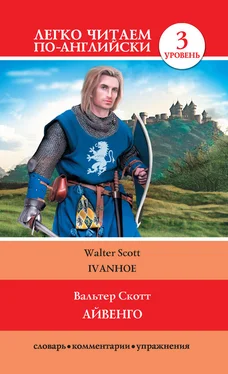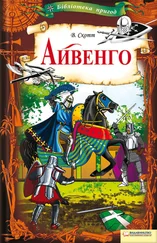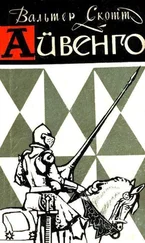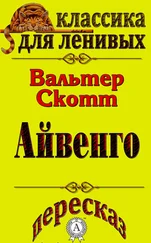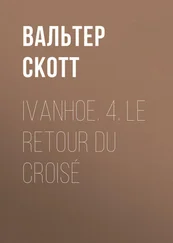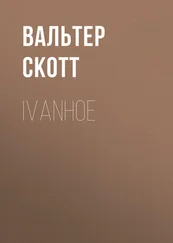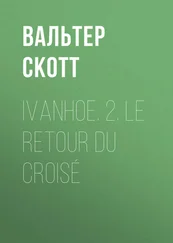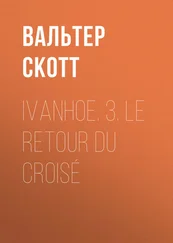“But your kingdom,” said Ivanhoe, “your kingdom is threatened with civil war.”
“Ho! ho! my kingdom and my servants?” answered Richard, impatiently; “I tell you, Sir Wilfred, the best of them do the same. For example, my very faithful servant Wilfred of Ivanhoe will not obey my positive commands, and yet reads his King a homily, because he does not walk exactly by his advice. Yet forgive me, my faithful Wilfred. I need to disguise myself to give my friends and faithful nobles time to assemble their forces. Estoteville and Bohun will not be strong enough to move forward to York for one more day. I must have news of Salisbury from the south. The Chancellor must make sure of London.”
Wilfred only sighed, and Richard went on in conversation with Robin Hood. – “King of Outlaws,” he said, “have you no refreshment to offer to your brother monarch?”
“If your Grace, then,” said Robin, “will again honour with your presence one of Robin Hood’s places of rendezvous, the venison shall not be lacking; and a stoup of ale, and it may be a cup of reasonably good wine.”
Beneath a huge oak-tree the King of England sat surrounded by bandits. As the flagon went round, the rough foresters soon lost their awe for the presence of Majesty. They sang and told jokes, and the King laughed with them.
After some time the King together with Ivanhoe, Gurth and Wamba went to Coningsburgh. They arrived when the sun was yet in the horizon.
* * *
When Richard and Ivanhoe reached Coningsburgh and were led to the castle hall, Wilfred hid his face in his cloak to show it to his father when the King gives him the signal.
In this apartment sat members of the most important Saxon families in this part of the country. They were all old, with grey hair and long beards, and sat in silence. They were looking down on Earth with sorrow.
Cedric, who was sitting with them, seemed to act as chief of the assembly. When Richard entered, he rose and greeted him. Then he led him into a small and dark chapel. Two torches gave enough light to see the naked walls and the rude altar of stone. Before this altar there was a sarcophagus and on each side of it kneeled three priests, who were muttering their prayers. A big sum of money was paid to the convent of Saint Edmund’s by Athelstane’s mother; and to deserve it almost all the monks moved to Coningsburgh, where, while six of them were constantly near the sarcophagus of Athelstane, the others took their share of the food and drinks.
When they were alone in a special room for guests of a high rank Richard said to Cedric: “You have known me only as the Black Knight—Know me now as Richard Plantagenet.”
“Richard of Anjou!” exclaimed Cedric, stepping backward with astonishment.
“No, noble Cedric—Richard of England! – whose deepest interest is to see her sons united with each other. Now I want to remind you, noble Saxon, that when we last parted, you promised to give me a reward for what I’ve done for you.”
“It is given before it is named,” said Cedric.
“Then I demand from you, as a man of your word, to forgive the good knight, Wilfred of Ivanhoe.”
“Then this is Wilfred!” said Cedric.
“My father! – my father!” said Ivanhoe, throwing away his cloak and falling down at Cedric’s feet, “give me your forgiveness!”
“You have it, my son,” said Cedric, raising him up. “You are about to speak,” he added, “and I guess the topic. The Lady Rowena must complete two years’ mourning, as if for her husband before she can get married again. The ghost of Athelstane himself would come and stand before us to forbid us forget about his honour.”
It seemed that Cedric’s words had raised a ghost, because at this moment the door flew open and Athelstane, dressed in the garments of the grave, stood before them, pale, tired, and like someone arisen from the dead!
The effect of his appearance was very strong. Cedric started back as far as the wall of the apartment would let him and gazed on the figure of his friend with eyes that seemed fixed, and a mouth which he couldn’t shut. Ivanhoe crossed himself, repeating all the prayers in Saxon, Latin, or Norman-French that he could remember, without understanding his own words.
In the meantime, a horrible noise was heard below stairs, some crying, “Hold the monks!” and others, “Throw them into the dungeon!”
“In the name of God!” said Cedric, addressing what seemed the ghost of his dead friend, “if you are a man, speak! – if a spirit, say why you visit us. – Living or dead, noble Athelstane, speak to Cedric!”
“I will,” said the ghost, very calmly, “when I have collected breath, and when you give me time—Alive, you said? – I am as much alive as he can be who has eaten bread and drunk water for three days!”
“Why, noble Athelstane,” said the Black Knight, “I myself saw you struck down by the fierce Templar near the end of the storm at Torquilstone, and I thought, and Wamba reported, that your skull was cut through the teeth.”
“You thought wrong, Sir Knight,” said Athelstane, “My teeth are in good order, and my supper will know that in a moment – the Templar’s sword turned in his hand, so it struck me flat. I fell down, stunned, but unwounded. Others were beaten down and killed above me, so I never recovered my senses until I found myself in a coffin—(an open one, by good luck)—placed before the altar of the church of Saint Edmund’s. I sneezed, groaned and would have climbed out of it, when the Abbot, full of terror, came running at the noise, surprised and in no way happy to find the man alive, whose heir he imagined to be. I asked for wine, he gave me some, but he added something to it, because I fell asleep and didn’t wake up for many hours. When I did, I found that I was in a very dark place with my arms and feet tied. I had strange thoughts of what had happened, when the door of my dungeon opened, and two monks entered. They would have persuaded me I was in purgatory, but I knew too well the voice of the Abbot.”
“Have patience, noble Athelstane,” said the King, “take breath, tell your story. Such a story is as well worth listening to as a romance.”
“Yes, but there was no romance in the matter!” said Athelstane. – “A loaf of bread and a jug of water—that’s all that they gave me, their patron!”
“But, in the name of Our Lady, noble Athelstane,” said Cedric, grasping the hand of his friend, “how did you escape—did they let you go?”
“Let me go!” echoed Athelstane, “No, they left the monastery to eat my funeral feast and sing their psalms. Then the keeper who brought me food drank some wine and forgot to shut the door. My chains were old and rusty, I pulled and they went out of the wall. Then I climbed the stairs, struck the keeper senseless and left him on the floor. I ate some baked meat, and took a leathern bottle of wine, went to the stable, and found in a private stall my own best horse. Here I came with all the speed, everybody running from me wherever I came, taking me for a ghost.”
“And you have found me,” said Cedric, “ready to start again on our brave projects for saving the noble Saxon people.”
“Don’t talk to me about saving any one,” said Athelstane, “I am happy I am saved myself.”
“Shame on you, noble Athelstane,” said Cedric, “tell this Norman Prince, Richard of Anjou, that you have a right to sit on the throne of England.”
“How!” said Athelstane, “is this the noble King Richard?”
“It is Richard Plantagenet himself,” said Cedric.
“Then,” said Athelstane, “I here proclaim my loyalty to him. My mother, my friend, please, don’t talk about my rights. Bread and water and a dungeon kill unnecessary ambition, and I rise from the tomb a wiser man than I descended into it. This whole idea can only end in the deaths of some thousands of simple people. I tell you, I will be a King in my own lands, and nowhere else.”
Читать дальше
Конец ознакомительного отрывка
Купить книгу
